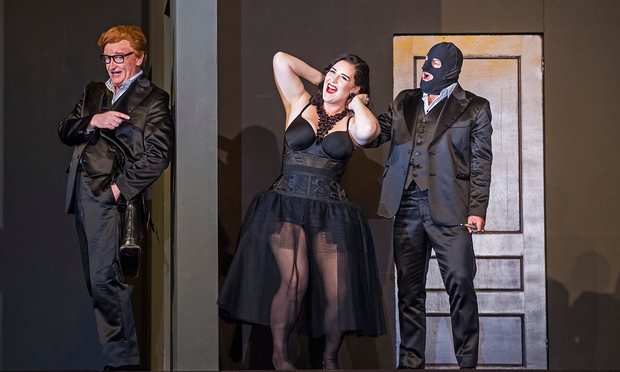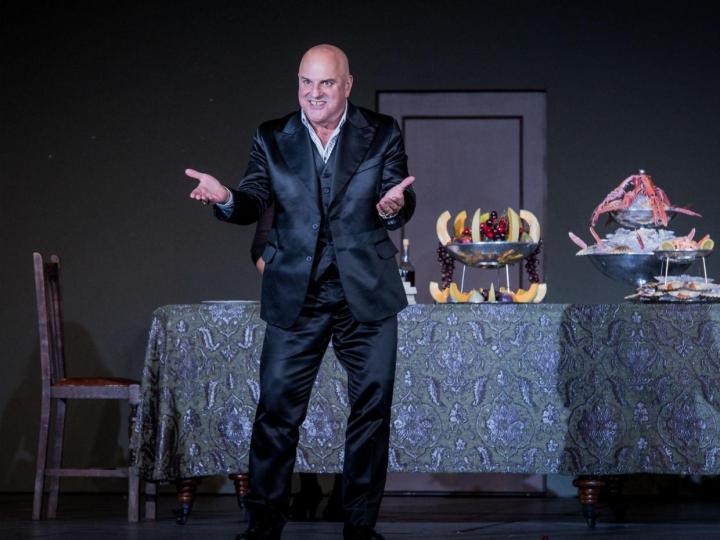![]()
![]()
A middle-aged man in a shiny suit stands in a bland and minimalist corridor set. Every few moments a woman walks by, goes behind a door with him for a few short seconds, they come out together completely unflustered and a few moments later this happens again. And again. And again. Either the short time spent behind the door is meant to effect a feeling of sped up time, or Don Giovanni is the quickest and most disappointing lay in history. In any case the sequence is annoying, pointless, and fails entirely to effectively communicate anything meaningful about the main character of this classic operatic work. Meanwhile this empty and boring charade completely distracted me from Mozart’s Overture, which irritated me even further.
The perceived need to ‘cover’ the time of the Overture without having any useful ideas about how to do so is an affliction of many operatic productions, great and otherwise. Unfortunately on this occasion, at least for this particular performance, this confusing and pointless exposition was indeed a sad taster of the production that followed. Indeed when the interval came my opera buddy and I also walked out of a door, disappointed and relieved not to return for the second half. Although not quite in numbers as great as the Don’s conquests, we weren’t even close to being the only ones to do this last Tuesday. Whilst I am fully aware that it may be seen as unjust to review a production I only saw half of, I have never walked out of a theatre in my life before which, I feel, is justification and review enough in itself.

Don Giovanni is a notoriously difficult opera to put on. Like so many of Mozart’s librettos the storyline delivers a string of gaping holes and the characters are so confused in their identities and motivations that it’s almost impossible to sustain them in a dramatic world that, having been touched by the study of realism, is no longer willing to tolerate portrayals that don’t follow consistently from one moment to another. It can of course be done thrillingly well – but instead of seizing the ingenious music and the erotic farce and the power of the underlying mortality tale , this production seems to try to ignore them with a low-energy ‘minimalism’ and hope that they’ll go away. They didn’t. In addition, my Year 12 class (who I sent to the opening night last Friday) explained that in the second half the plot has been entirely changed, completely removing any moral direction or meaning from the iconic story in favour of a series of gimmicks with wigs.
Christopher Purves was not in good voice, with a sometimes soft-rock vocal timbre and musically uninspiring presentation of the lead character. His banter with Clive Bayley’s Leporello was witty indeed, but it was Bayley himself who for me was the vocal star of the show followed closely by Allan Clayton as Don Ottavio and, in certain glorious moments, Caitlyn Lynch as Donna Anna. Clayton is tender and is one of the only principals to convincingly act his character throughout. Despite thrilling top notes Lynch seemed at a loss on the acting front for how to portray grief believably – a great flaw in any Donna Anna. Her opening aria was musically enchanting despite a frustrating mismatch between her lyric vibrato and Clayton’s lighter tone. Her reaction to the murder of her father was completely unconvincing as she stood still and expressionless whilst accounting it through song. Christine Rice as Donna Elvira had a vibrato that was far too wide for my personal taste and at times I felt that the shape of Mozart’s more delicate coloratura lines was almost completely obscured by it. Her Elvira was more annoying than pitiful, which makes it difficult to engage properly with the wider themes that are supposed to run through the characters’ relationships.
Mary Bevan has received mixed reviews as Zerlina. On this occasion I found her uncharacteristically mediocre and dramatically dubious. The character of Zerlina, with her erratic and conflicting emotions, suffers in condensed form all the difficulties of inconsistency in the wider libretto of Don Giovanni. She is undeniably a challenge to play, however I didn’t feel that Bevan herself was clear on Zerlina’s motivations. I feel that the character can be made to work well when given a direction, for example either truly in love with Masetto or secretly leaning towards Don Giovanni, but Bevan conveyed a swinging ambivalence that was not supported enough to provide a good basis for the trajectory of her role. The high notes she delivered in the Act 1 Aria ‘Batti, batti, o bel Masetto’ were surprisingly thin and even strained. James Creswell as Masetto actually fell a full half bar out with Wigglesworth and the Orchestra at one point, something I have never seen on a major operatic stage.

Given the fragility of the ENO at the present time and its huge importance as the bridge between this incredible art form and the vernacular, performers cannot afford to have ‘off’ evenings and the production teams cannot be allowed to deliver uninspiring, bland or flawed productions. The reviews of Tosca, which is also currently playing at The Coliseum, are equally flat and betray a failure to connect with young audiences. This production also fell down on basic points of execution such as tacky sets and costume additions that looked cheap instead of minimalist, and the moment where the (heartbreakingly small) chorus could be heard stomping into their next position behind the set front. Some of the best opera productions I’ve seen have been at the ENO (see Akhnaten, The Magic Flute). Between an exodus at half time and a group of 17 year olds who, despite being first-time opera-goers, were annoyed by an alternative ending that “doesn’t make sense”, this is not the way to ensure the future of Opera performed in English or this Opera Company.
